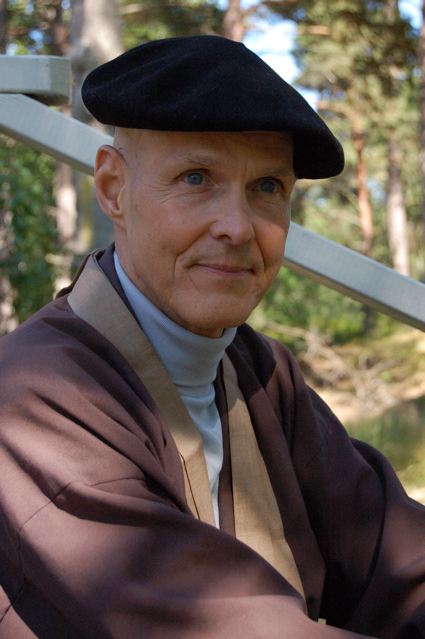Reb Anderson
Reb Anderson in Crooked Cucumber
Katherine Thanas remembers a talk by Reb Anderson.
Brief discussion with a few Suzuki disciples about the time of the Sandokai talks, the summer of 1970
Dharma talks by Reb Anderson on Engage Wisdom
Books by Reb Anderson
Nothing to Attain: Zen Stories of Faith and Understanding, Shambhala, 2026.
Entering the Mind of Buddha: Zen and the Six Heroic Practices of Bodhisattvas, Shambhala, 2019.
The Third Turning of the Wheel: Wisdom of the Samdhinirmocana Sutra, Shambhala, 2012.
Being Upright: Zen Meditation and the Bodhisattva Precepts, Shambhala, 2000.
 Warm Smiles from Cold Mountains: A Collection of
Talks on Zen Meditation. Shambhala, 1999.
Warm Smiles from Cold Mountains: A Collection of
Talks on Zen Meditation. Shambhala, 1999.

We're unsure where the following was recorded. Apparently in about 1995.
He went to Tass, and when he came back his health was really broken. I almost got a little angry he was so broken—it was like he squeezed it all out. So they thought he had hepatitis, he was yellow—the visiting Japanese doctors thought he had hepatitis but he had liver cancer, and that was 24 years ago so I don't know if they can do anything now, but there was no discussion of anything, of any treatment. Some kind of funny people, I don't know if I should say funny people, suggested some very far out things, but he didn't pick up on it. It was very painful for him. I don't know if he was toughing it out again, or if there is no pain killer for it cause it's so deep—other than knocking the person out—so he just toughed it out. But still when he found that he had liver cancer, he thought, the human being thought he would live a couple of more years, so I was kind of gearing up to study with him a couple of more years in some way. But it was powerful, and it just came on so fast, it really surprised us, it surprised him too. I don't think he was kidding us. I think it's just that it came on really strong, stronger than we thought, so it was a much shorter time we had with him—just a little more than three months from the time of diagnosis.
Towards the end of his life, he kept going to the zendo for a while. He could go downstairs to the zendo and sit, but he couldn't get back up. So we gave him rides up. It was lots of fun—he was very sweet about it. We made this little chair with our arms and carried him up the stairs. He was very dear and very sweet, and he taught us while riding on our arms, he taught us. He was there being a little cutie pie in our arms. He was teaching us. And later he couldn't go down to the zendo anymore, didn't give lectures, didn't do ceremonies, don't give dokusan - just suffering SR, just suffering SR. Moment by moment—that's what he was. He wasn't what I expected a Zen teacher to be like, he wasn't what you usually think a Zen master is like, but he was there being that sick man. And I remember his dharma talks and I remember him in the zendo—that was wonderful teaching. I remember him moving rocks—wonderful teaching. I remember seeing him eat—that was wonderful teaching. He was teaching all the time in every situation. But when he couldn't sit anymore and couldn't walk anymore, he still taught right from there [ stomach? heart?]. And every moment I was with him when he was dying—I'll never forget those moments—maybe cause I knew they were going to be the last—I don't know. He showed that although he did do monastic forms and traditional practices, the teaching is not limited to those forms and comes off of us, it emanates from us all day long in every situation. He showed that, and he saw it in us.
So, I don't know if that's what it was with SR but he looked right at me, he looked right straight in my face, and all of a sudden he said, "Things teach best when they're dying." I thought now what's that about—I didn't understand. And he didn't tell us that the gall bladder was malignant, so we didn't know, so I can understand why he looked at me and said that. Some part of me got it—it struck me, but I couldn't really think, he's telling me that he's dying even though it really struck me.
As an Amazon Associate Cuke Archives earns from qualifying purchases.
